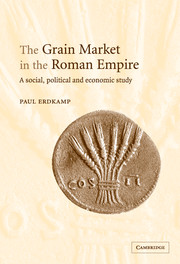Book contents
- Frontmatter
- Contents
- List of maps
- Acknowledgements
- Map 1 Asia Minor
- Map 2 Greece
- Map 3 Italy
- Map 4 The Roman World
- Map 5 Egypt
- Introduction
- 1 Production and productivity in Roman agriculture
- 2 The world of the smallholder
- 3 Farmers and their market relations
- 4 Market integration: connecting supply and demand
- 5 Rome and the corn provinces
- 6 Urban food supply and grain market intervention
- Conclusions
- References
- General index
- Index locorum
Conclusions
Published online by Cambridge University Press: 04 November 2009
- Frontmatter
- Contents
- List of maps
- Acknowledgements
- Map 1 Asia Minor
- Map 2 Greece
- Map 3 Italy
- Map 4 The Roman World
- Map 5 Egypt
- Introduction
- 1 Production and productivity in Roman agriculture
- 2 The world of the smallholder
- 3 Farmers and their market relations
- 4 Market integration: connecting supply and demand
- 5 Rome and the corn provinces
- 6 Urban food supply and grain market intervention
- Conclusions
- References
- General index
- Index locorum
Summary
The grain supply is an important element of the economy of the Roman world and of its social and political history. Grain was the most important item of food in antiquity. Hence, it is more central to our understanding of the Roman economy and society than, for instance, olive oil or wine. The economy is partly a response to climate and geography; economic development can be seen as a struggle to overcome the ecological factor. This may explain many of the similarities between Mediterranean societies in Roman and later times. However, neither the economy nor society are determined solely by ecological constraints. Social and political factors played an important role. Hence, an analysis of the grain market is as much a social and political study as it is an economic one.
All sectors of the economy depended ultimately on their access to the means of subsistence, whether the people engaged in these sectors produced food, other items and services, or – in an economic sense – nothing at all. The size of these sectors and their relations to one another determine the structure and scale of the economy. The distribution of food may be seen as the mechanism that connects them all. The division of labour in pre-industrial societies is characterised by a large agriculturally productive sector and a rather small non-agricultural sector.
- Type
- Chapter
- Information
- The Grain Market in the Roman EmpireA Social, Political and Economic Study, pp. 317 - 330Publisher: Cambridge University PressPrint publication year: 2005



